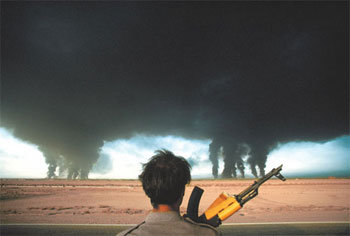Expose on New Cold War over Resources
Expose on New Cold War over Resources
Posted January. 12, 2008 03:01,

A new book, The New Cold War: The Battle for Natural Resources (Der neue Kalte Krieg. Kampf um die Rohstoffe in German) speaks of a new global conflict over energy resources.
The authors, who are reporters at Germanys leading weekly magazine Der Spiegel, say energy superpowers use underdeveloped countries as proxies, letting them fight under their influence to the latters detriment. Energy superpowers are not countries with abundant resources, but those that can decide energy supplies. Underdeveloped countries with rich resources do not benefit from their resources, as their corrupt authoritarian governments collude with powerful countries and allow their people to starve.
The authors call this the curse of natural resources.
The book says the major competitors are the U.S., a superpower that has lost its absolute hegemony, emerging economic powers China and India, and Russia. All of them seek to secure crude oil, natural gas, uranium, iron ore and coal.
This book comprises analyses and prospects written by 19 Der Spiegel reporters.
The authors go into wars over oil and gas, fears over the looming energy crisis, and the production and consumption structure of natural resources based on their reporting experience.
The strength of the book lies in its insight into resources. It awakens those who take it for granted the news of oil prices hitting new records, showing the energy that people use daily is at the expense of bloody resource wars in the world.
Washington is critical of Moscows human rights violations, but in a G-8 summit meeting in 2006, the U.S. promised to build the worlds largest radioactive waste treatment facilities in Siberia for 20 billion U.S. dollars. The U.S. has also offered India nuclear fuel and reactor technologies.
The book criticizes Americas double standards, saying, India is not a member of the Nuclear Non-Proliferation Treaty, but the U.S. is favorable to India.
How will the new Cold War develop? The book says the absolute amount of natural resources, which enabled the balance of new power, is decreasing and that the scarcity of resources will lead to conflict and military confrontation. This is because energy superpowers will make their demands with force when they find oil reserves critical to survival wherever they might be.
The analysis also focuses on Iran. The Middle Eastern country has absolute power over southern Iraq, where a huge amount of oil and natural gas are buried.
China has seen soaring energy demand due to rapid economic development. Beijing is helping Tehrans missile development to secure energy, which has angered Washington.
The authors shed light on three energy companies, or new world powers, including the Australia-based BHP Billiton. The company accounts for three quarters of the worlds iron supply. If the three stop supplying ore for a week, it would paralyze the global iron industry and cause the frightening collapse of the world economy.
zeitung@donga.com







